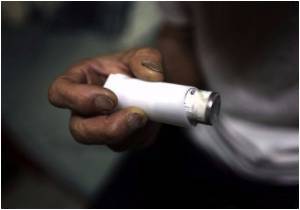In adults with persistent asthma, elevated blood eosinophil levels may be able to predict which individuals are at increased risk for exacerbations.

Eosinophils are white blood cells that become active in individuals with certain allergic diseases, including asthma, and other medical conditions.
In the study, blood eosinophil levels were measured in 2,392 adult asthma patients in 2010 and the relationship between these levels and the rate of exacerbations in 2011 was determined in analyses adjusting for demographics, co-morbidities, and asthma burden and care.
Increasing level of blood eosinophil at baseline was associated with increasing risk of future asthma exacerbation in both crude and adjusted analyses. The relationship was observed in crude analysis for baseline eosinophil level of >300/mm3 (crude rate ratio 1.25; 95% CI, 1.04-1.51, P = 0.02) and was weaker after adjustment for baseline characteristics (adjusted rate ratio 1.16; 95% CI, 0.97-1.39, P=0.11). A baseline eosinophil level of >400/mm3 was associated with future asthma exacerbations in 2011 after adjustment for baseline features (adjusted rate ratio 1.31; 95% CI, 1.07-1.60, P<0.01).
Other factors in 2010 that were significantly associated with an increased risk of exacerbations in 2011 included a history of prior asthma exacerbations, GINA steps-4/5 care, dispensing of 7 or more short-acting beta-agonist canisters, female gender, black ethnicity, and obesity.
"Our findings suggest that asthma patients with an elevated blood eosinophil level have a greater disease burden," said Dr. Zeiger. "If our findings can be replicated in other populations and settings, measurement of blood eosinophil levels may help guide treatment for patients at the greatest risk for exacerbations."
 MEDINDIA
MEDINDIA




 Email
Email










